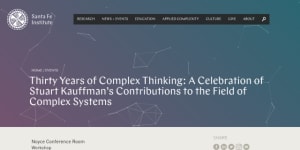
Archives of 2019
-

-
Espace-temps et individuation
Dans le cadre de la relativité générale, l'espace temps constitue un bloc géométrisé où la temporalité en tant que telle disparaît. Ce cadre est extrêmement éloigné de la biologie où la temporalité possède un rôle central parce que l'historicité biologique est fondamentale. Néanmoins le processus d'individuation organique s'appuie sur la capacité du vivant à être organisateur de son espace-temps. Il s'agit là d'une condition de possibilité de l'individuation dont nous développerons certains aspects remarquables.
-
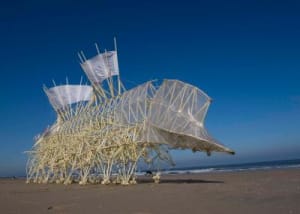
Technology, art and autonomy
-

Comment objectiver les nouveaux possibles en biologie?
-
L’anthropocène comme désorganisation du vivant
La crise que constitue l'Anthropocène est souvent décrite à travers la raréfaction de ressources. Pourtant un autre aspect de cette crise est tout aussi critique et concerne aussi les humains: la désorganisation des organismes et des écosystèmes. Nous introduirons brièvement cette question et montrerons qu'elle demande des raisonnements spécifiques.
-

Espaces des possibles et nouveauté : De la musique à la biologie
-
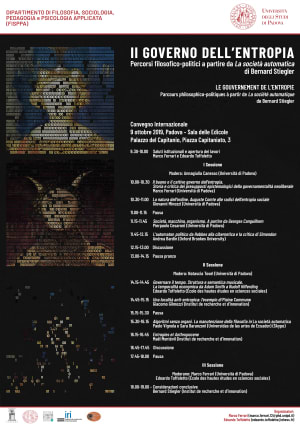
L’anthropocène comme désorganisation du vivant
-

Mesurer le vivant
-
No entailing laws but enablement in the evolution of the biosphere
-
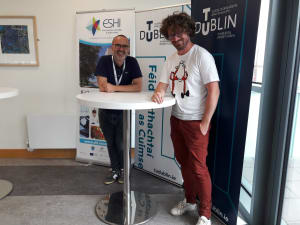
Why theorization has to make a comeback if we are to meet the challenges of the anthropocene.
-
Principle of organization, integration of the principles and application — precision biology: Concepts and measurements
Organization constitutes an overarching hypoth- esis that frames the intelligibility of biological objects. We offer a specific characterization of organization in terms of closure of con- straints. The adoption of organization as a principle fosters an orig- inal approach to biological stability. We elaborate on its articulation with the two other theoretical principles addressed in this session and use them to discuss what it means to access empirical objects in biology. Finally, we address measurement and precision in biology.
-

Groupe 1 epistemology: Anthropocene, exosomatization and negentropy
-
La recherche technologique à l’IRI : Méthode pour une clinique contributive.
-

Introduction: Sabina leonelli, la recherche scientifique à l’ère des big data
-
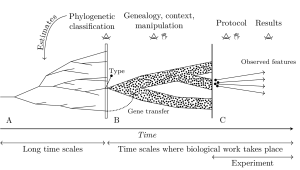
Measurement in biology is methodized by theory
Biology & Philosophy
We characterize measurement in biology from a theoretical perspective with a focus on historicity. We analyze experimental strategies and reproducibility.
Abstract
We characterize access to empirical objects in biology from a theoretical perspective. Unlike objects in current physical theories, biological objects are the result of a history and their variations continue to generate a history. This property is the starting point of our concept of measurement. We argue that biological measurement is relative to a natural history which is shared by the different objects subjected to the measurement and is more or less constrained by biologists. We call symmetrization the theoretical and often concrete operation which leads to considering biological objects as equivalent in a measurement. Last, we use our notion of measurement to analyze research strategies. Some strategies aim to bring biology closer to the epistemology of physical theories, by studying objects as similar as possible, while others build on biological diversity.
Keywords: measurement, evolution, experiments, strains, symmetry, systematics
Manuscript Citation Publisher Full textCitation
Montévil, Maël. 2019. “Measurement in Biology Is Methodized by Theory.” Biology & Philosophy 34 (3): 35. https://doi.org/10.1007/s10539-019-9687-x -
Repenser la modélisation à l’aune de l’historicité des phénomènes vivants
L'utilisation des mathématiques pour comprendre le vivant est souvent conçue à l'aune de son utilisation en physique. Pourtant, la biologie possède des spécificités qui sont parfois mobilisées pour la modélisation. En particulier, les êtres vivants sont le résultat d'une double histoire, évolutive et individuelle. Nous aborderons plusieurs conséquences de cette historicité du vivant, tant au niveau de la modélisation à proprement parler que pour l'accès aux phénomènes, dans l’expérience.
-

Table ronde « enjeux politiques et écologiques du biomorphisme »
-

Le sens des formes en biologie
Dans l'interface entre biologie et mathématiques, les formes et les processus de morphogenèse sont souvent étudiées en "eux-même". Nous montrerons que cette manière de procéder est insuffisante pour capturer le sens biologique de ces formes. La biologie comporte des spécificités qui se manifestent tant sur le plan philosophique que sur celui des principes théoriques : en particulier, tout processus biologique tel qu’un processus de morphogenèse ou une régulation physiologique (i) s’inscrit dans l’évolution et dans une histoire naturelle et (ii) s’intègre dans un organisme dont il dépend et auquel il participe. Nous aborderons alors le sens des formes biologiques à l'aune de ces principes, tant au niveau de la théorie qu'au niveau de la compréhension de l'accès expérimental aux objets biologiques.
-
L’individuation biologique : Approche épistémologique et théorique
-
Entretien sur l’entropie, le vivant et la technique : Première partie
Links series
Entretien entre B. Stiegler et M. Montévil sur l'entropie et l'anti-entropie dans l'étude du vivant et des techniques et pour les enjeux de l'Anthropocène.
Manuscript Citation Publisher Full textCitation
Stiegler, B., and Maël Montévil. 2019. “Entretien Sur l’entropie, Le Vivant et La Technique : Première Partie.” Links Series 1. http://links-series.com/n-1-2-virtuel-et-biologie/




